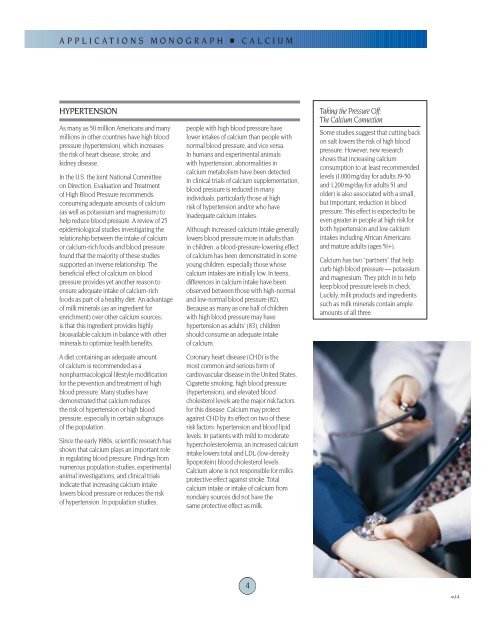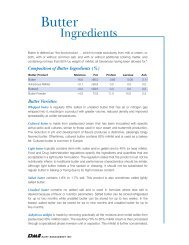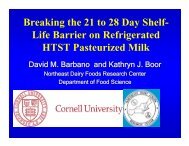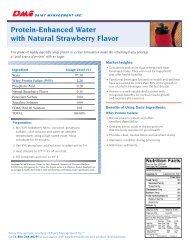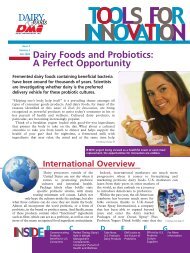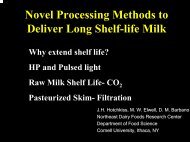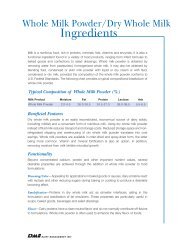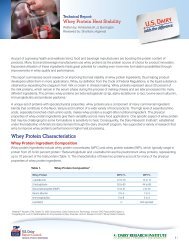Whey products, milk minerals and dairy calcium - InnovateWithDairy ...
Whey products, milk minerals and dairy calcium - InnovateWithDairy ...
Whey products, milk minerals and dairy calcium - InnovateWithDairy ...
Create successful ePaper yourself
Turn your PDF publications into a flip-book with our unique Google optimized e-Paper software.
APPLICATIONS MONOGRAPH ■ CALCIUMHYPERTENSIONAs many as 50 million Americans <strong>and</strong> manymillions in other countries have high bloodpressure (hypertension), which increasesthe risk of heart disease, stroke, <strong>and</strong>kidney disease.In the U.S. the Joint National Committeeon Direction, Evaluation <strong>and</strong> Treatmentof High Blood Pressure recommendsconsuming adequate amounts of <strong>calcium</strong>(as well as potassium <strong>and</strong> magnesium) tohelp reduce blood pressure. A review of 25epidemiological studies investigating therelationship between the intake of <strong>calcium</strong>or <strong>calcium</strong>-rich foods <strong>and</strong> blood pressurefound that the majority of these studiessupported an inverse relationship. Thebeneficial effect of <strong>calcium</strong> on bloodpressure provides yet another reason toensure adequate intake of <strong>calcium</strong>-richfoods as part of a healthy diet. An advantageof <strong>milk</strong> <strong>minerals</strong> (as an ingredient forenrichment) over other <strong>calcium</strong> sources,is that this ingredient provides highlybioavailable <strong>calcium</strong> in balance with other<strong>minerals</strong> to optimize health benefits.A diet containing an adequate amountof <strong>calcium</strong> is recommended as anonpharmacological lifestyle modificationfor the prevention <strong>and</strong> treatment of highblood pressure. Many studies havedemonstrated that <strong>calcium</strong> reducesthe risk of hypertension or high bloodpressure, especially in certain subgroupsof the population.Since the early 1980s, scientific research hasshown that <strong>calcium</strong> plays an important rolein regulating blood pressure. Findings fromnumerous population studies, experimentalanimal investigations, <strong>and</strong> clinical trialsindicate that increasing <strong>calcium</strong> intakelowers blood pressure or reduces the riskof hypertension. In population studies,people with high blood pressure havelower intakes of <strong>calcium</strong> than people withnormal blood pressure, <strong>and</strong> vice versa.In humans <strong>and</strong> experimental animalswith hypertension, abnormalities in<strong>calcium</strong> metabolism have been detected.In clinical trials of <strong>calcium</strong> supplementation,blood pressure is reduced in manyindividuals, particularly those at highrisk of hypertension <strong>and</strong>/or who haveinadequate <strong>calcium</strong> intakes.Although increased <strong>calcium</strong> intake generallylowers blood pressure more in adults thanin children, a blood-pressure-lowering effectof <strong>calcium</strong> has been demonstrated in someyoung children, especially those whose<strong>calcium</strong> intakes are initially low. In teens,differences in <strong>calcium</strong> intake have beenobserved between those with high-normal<strong>and</strong> low-normal blood pressure (82).Because as many as one half of childrenwith high blood pressure may havehypertension as adults’ (83), childrenshould consume an adequate intakeof <strong>calcium</strong>.Coronary heart disease (CHD) is themost common <strong>and</strong> serious form ofcardiovascular disease in the United States.Cigarette smoking, high blood pressure(hypertension), <strong>and</strong> elevated bloodcholesterol levels are the major risk factorsfor this disease. Calcium may protectagainst CHD by its effect on two of theserisk factors: hypertension <strong>and</strong> blood lipidlevels. In patients with mild to moderatehypercholesterolemia, an increased <strong>calcium</strong>intake lowers total <strong>and</strong> LDL (low-densitylipoprotein) blood cholesterol levels.Calcium alone is not responsible for <strong>milk</strong>’sprotective effect against stroke. Total<strong>calcium</strong> intake or intake of <strong>calcium</strong> fromnon<strong>dairy</strong> sources did not have thesame protective effect as <strong>milk</strong>.Taking the Pressure Off:The Calcium ConnectionSome studies suggest that cutting backon salt lowers the risk of high bloodpressure. However, new researchshows that increasing <strong>calcium</strong>consumption to at least recommendedlevels (1,000mg/day for adults 19-50<strong>and</strong>1,200mg/day for adults 51 <strong>and</strong>older) is also associated with a small,but important, reduction in bloodpressure. This effect is expected to beeven greater in people at high risk forboth hypertension <strong>and</strong> low <strong>calcium</strong>intakes including African Americans<strong>and</strong> mature adults (ages 51+).Calcium has two “partners” that helpcurb high blood pressure — potassium<strong>and</strong> magnesium. They pitch in to helpkeep blood pressure levels in check.Luckily, <strong>milk</strong> <strong>products</strong> <strong>and</strong> ingredientssuch as <strong>milk</strong> <strong>minerals</strong> contain ampleamounts of all three.4eJ.4


